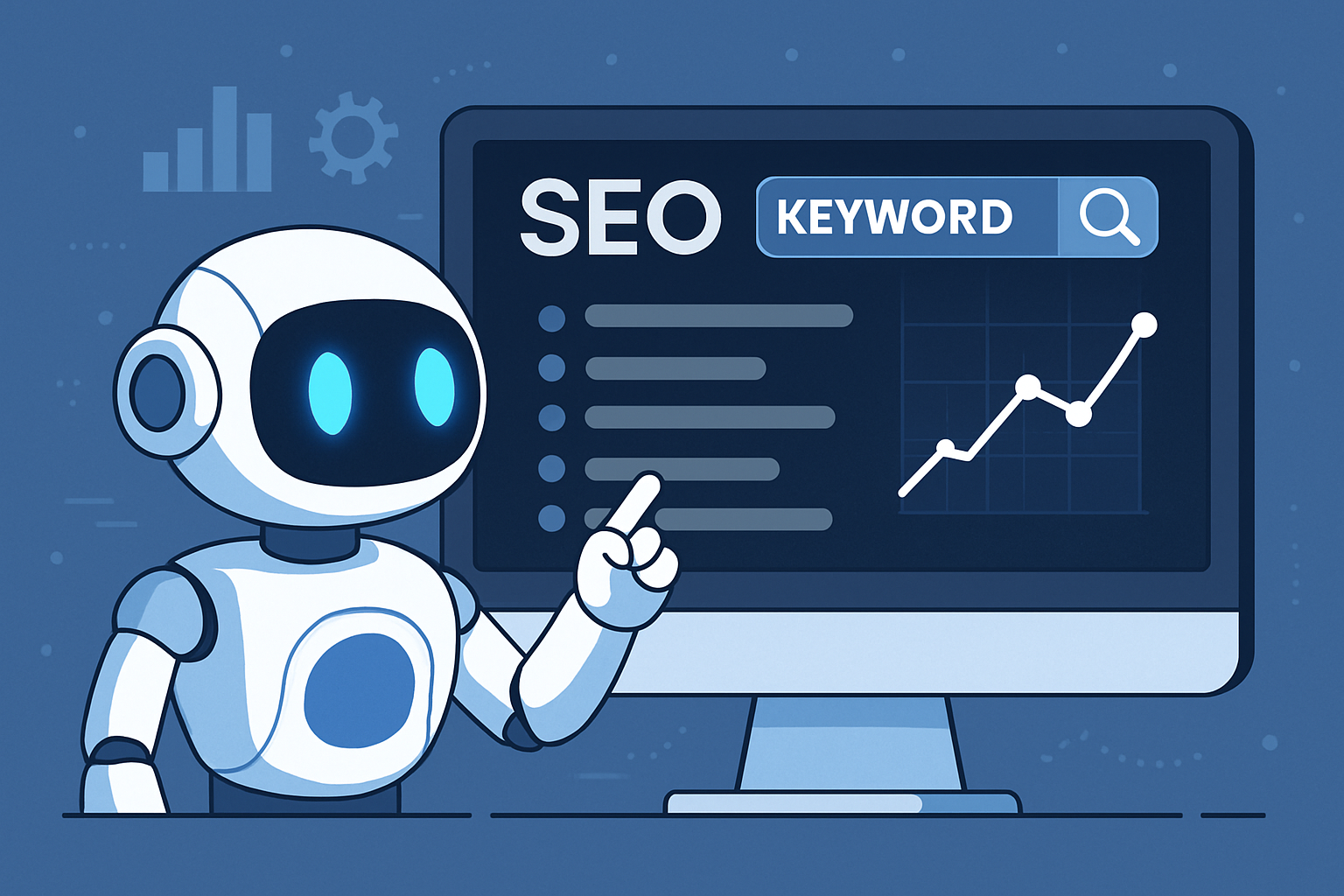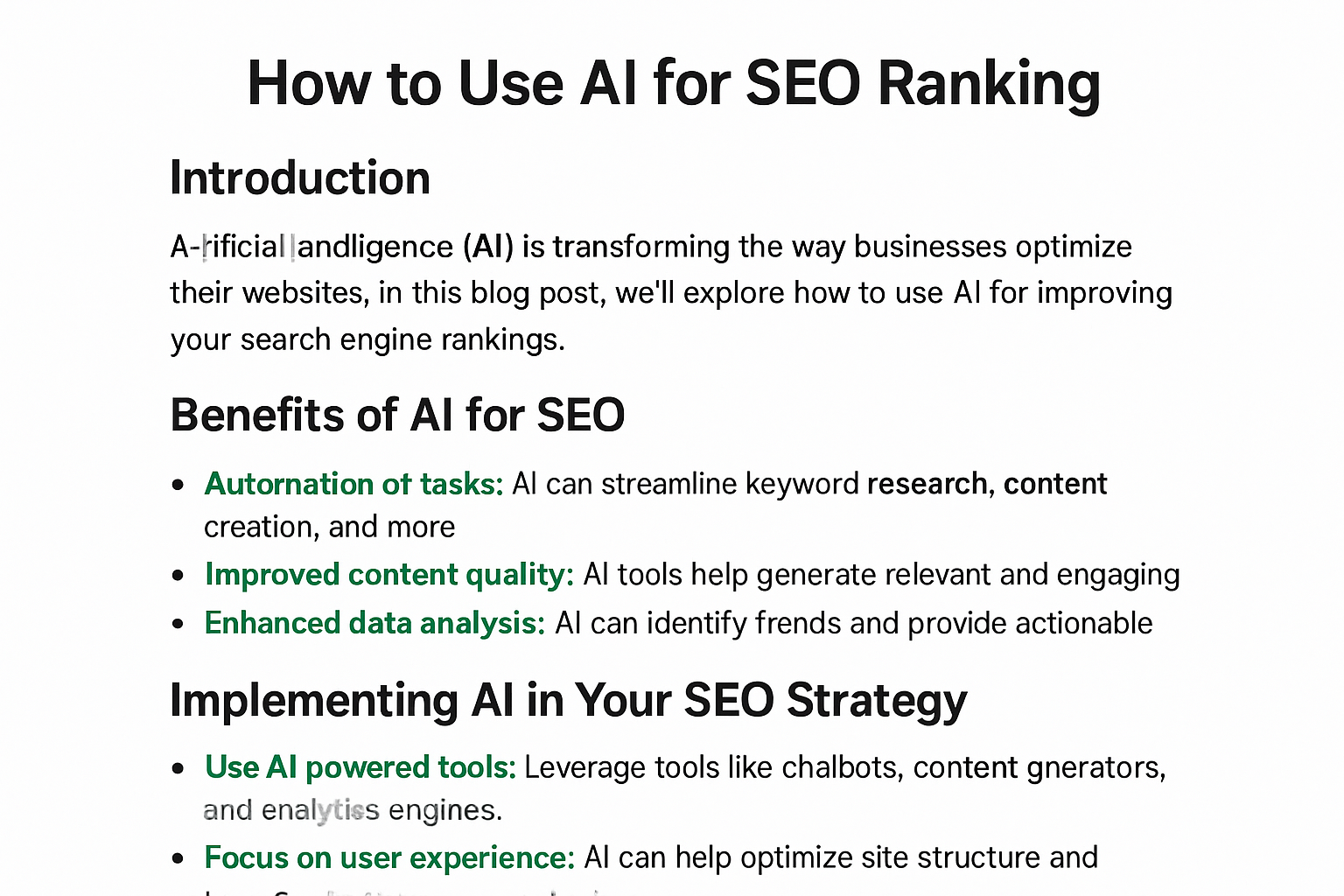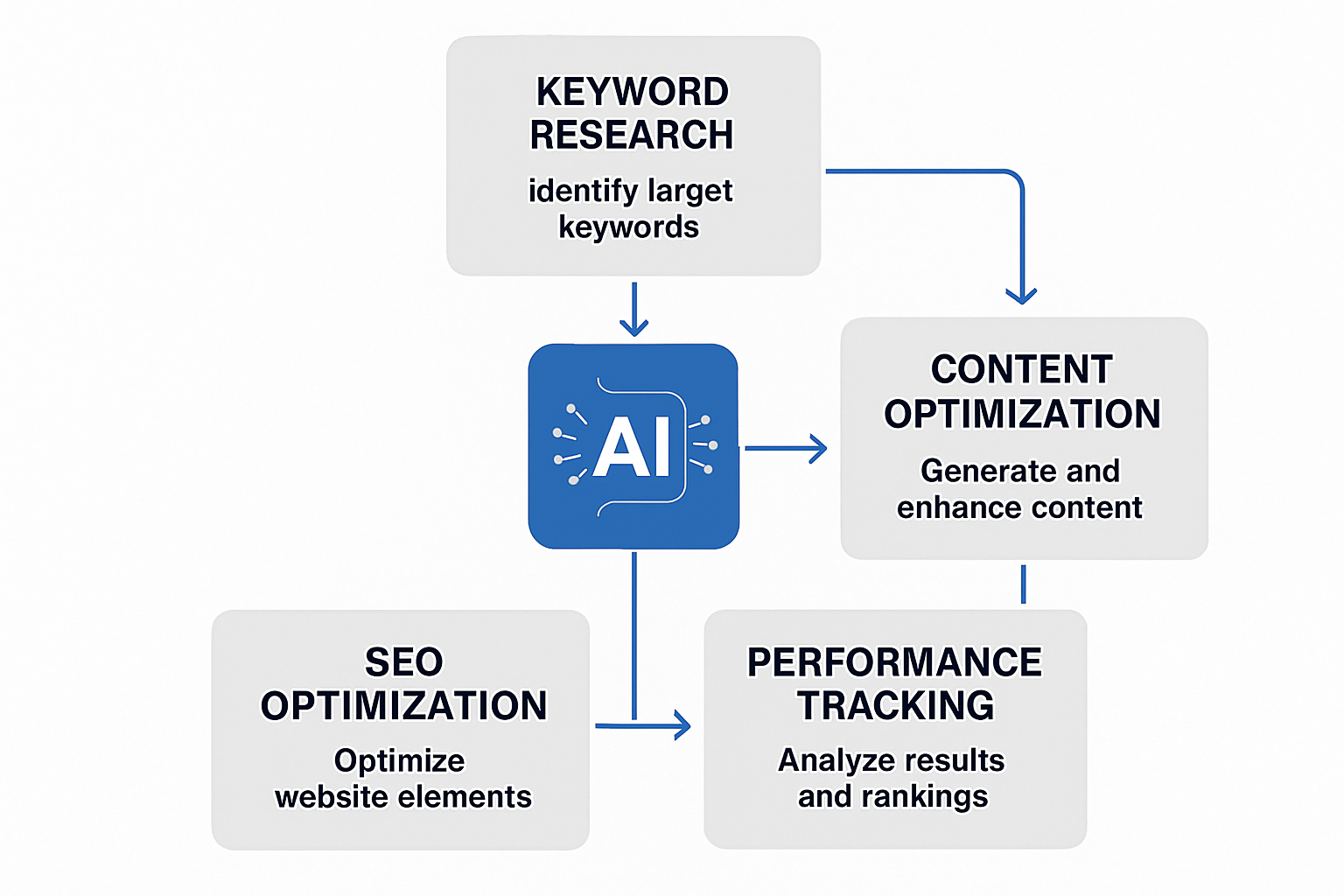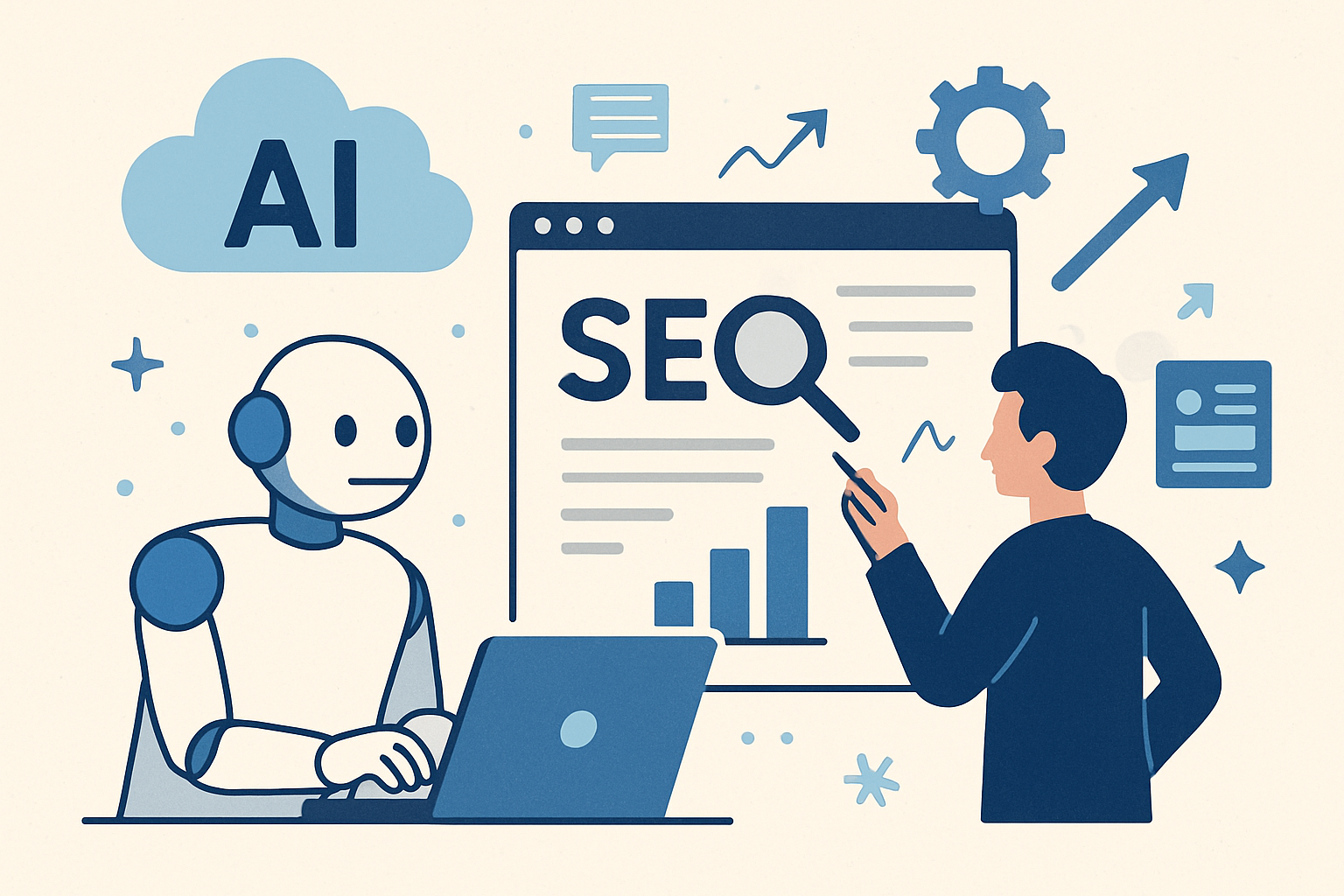TL;DR: AI can revolutionize your SEO ranking strategies by speeding up keyword research and content optimization. Here’s an in-depth guide on how to harness AI for SEO ranking success in 2025.
Everyone knows AI is transforming SEO faster than ever.
But what are the best ways to use AI for SEO ranking?
This article gives you a complete cheatsheet on leveraging AI to boost your search engine visibility.
Some are amazed by AI’s ability to process huge keyword data instantly.
Some are skeptical about the quality of AI-generated content.
Some are exploring hybrid approaches that combine AI speed with human creativity.
Some are already seeing massive gains from AI-driven SEO tools.
Some want step-by-step tactics that work right now—not vague theories.
Let's dive right in.
What Is AI SEO and Why Does It Matter in 2025?
AI SEO means using artificial intelligence to enhance and automate your SEO strategies. This involves AI tools that handle keyword research, content generation, on-page optimization, and performance analysis.
Why does it matter? Because search engines like Google now depend heavily on AI to understand, rank, and even generate search results through large language models (LLMs). If your SEO strategy doesn’t incorporate AI, you risk falling behind competitors who use it to unlock more targeted traffic and efficient content production.
AI can go beyond just keywords. It can analyze search intent, semantic context, and competitor gaps at scale. This helps marketers identify hidden opportunities and produce content tailored to what users actually want.
Thanks to AI, tedious SEO tasks like keyword clustering, internal linking, and meta tag optimization can be done faster and more accurately. Plus, AI-driven tools often offer data-backed suggestions to boost your page’s ranking potential.
For example, BrightEdge’s AI-powered tool called Instant generates 100X more keyword ideas than a manual seed list, allowing marketers to chase highly relevant terms with less effort and more precision [Source].

How Can AI Optimize Keyword Research for SEO?
Keyword research is foundational to SEO. AI takes it to the next level by not only evaluating search volume but also understanding the semantic relationships, user questions, and competitor gaps.
Traditional keyword research tools rely mainly on search volume and competition metrics. AI tools incorporate natural language processing (NLP) to analyze intent and cluster related keywords, helping content creators develop topical authority.
For instance, instead of treating “best running shoes” and “comfortable jogging sneakers” as unrelated, AI groups them under a footwear topic cluster. This lets you produce comprehensive content targeting multiple relevant queries, improving your chances of ranking for broad and long-tail search terms alike.
Another advantage: AI-powered tools identify voice search queries that mimic natural speech—an area growing rapidly with smart assistants like Google Assistant and Alexa. Optimizing content for these conversational queries can capture new audience segments.
Practical tip: Use AI tools like Semrush’s On Page SEO Checker to see where your keywords appear on your pages—title tags, headings, body content—and get suggestions for related keywords you should add to boost relevance [Source].
Step-By-Step To Smarter Keyword Research With AI
- Start with a seed list of main keywords related to your niche.
- Run them through an AI keyword tool to generate expanded keyword ideas and clusters.
- Analyze the intent behind each keyword—informational, transactional, navigational.
- Identify keywords with strong potential but low competition.
- Prioritize keywords for content creation based on relevance and business goals.
- Continuously monitor and add new keywords as trends emerge.
By following this approach, your keyword strategy becomes more data-driven, comprehensive, and aligned with what users search for in 2025.
What Are Best Practices for Using AI to Create SEO-Optimized Content?
AI writing tools can rapidly generate content drafts, product descriptions, meta descriptions, and even detailed content outlines. But AI alone can’t replace human creativity—or the need for quality control.
The key is to blend AI efficiency with human judgment. AI produces a first draft or a list of ideas, while writers refine it to ensure tone, brand voice, and accuracy remain intact.
Avoid blindly publishing AI-generated text. Always:
- Edit for natural flow and readability.
- Add unique insights, data, or examples that AI may miss.
- Ensure your target keywords appear naturally within the first 100-150 words, headings, URL, and meta tags.
- Use AI to suggest related keywords and semantic terms to sprinkle into the content.
- Structure content logically with clear headings, bullet lists, and short paragraphs.
- Optimize images with descriptive filenames and alt text featuring your keywords to support search engines and accessibility.
Remember, Google rewards content that satisfies search intent and offers valuable, novel information—not just keyword stuffing.
For example, Backlinko’s SEO checklist post stands out because it combines keyword optimization with unique data and a downloadable checklist, which boosts both authority and user engagement [Source].

Maximize AI with These Content Tips
- Make sure your title tag includes the primary keyword near the front for better ranking chances.
- Write compelling meta descriptions incorporating the keyword to improve click-through rates (CTR), even though meta descriptions don't directly influence ranking.
- Use long-tail keywords derived from AI suggestions to capture niche searches.
- Leverage AI-based editing tools to detect keyword usage, grammar, and style improvements.
- Update content regularly to maintain freshness and relevance.
How Does AI Improve On-Page SEO Elements?
On-page SEO involves optimizing everything directly on your webpage—title tags, meta descriptions, headings, URLs, images, internal links, and content structure. Each element influences how search engines understand and rank your site.
AI streamlines auditing and optimizing these elements. For example, tools like Semrush’s On Page SEO Checker quickly identify missing or duplicated title tags, suggest keyword placements, and recommend improvements tailored to your target keyword [Source].
AI can even generate structured data markup (schema) automatically. Schema helps search engines better understand your content type and display rich snippets like ratings or FAQs in results—these enhance visibility and CTR.
Internal linking is another crucial on-page factor AI supports. By analyzing your site’s link graph, AI can recommend authoritative pages to link from or to, using keyword-rich anchor text. This improves crawlability and boosts priority pages, which can positively impact SEO ranking.
AI also speeds up image optimization, suggesting appropriate alt text and filenames containing your main keywords. This enhances accessibility and tells search engines what each image is about.
Real-World On-Page AI Application Example
Consider Fugue, a cloud security company. Using Frase.io, an AI-powered SEO tool, they optimized their Cloud Security Posture Management page. The page advanced from 10th to 1st position in Google rankings after applying AI-recommended on-page improvements [Source].
What Are Top Strategies to Integrate AI in SEO Workflows?
Implementing AI for SEO ranking requires more than buying a tool. You need a strategic workflow that leverages AI’s strengths and human oversight.
Here’s a step-by-step to smart AI integration:
- Automate Keyword & Competitor Research: Use AI tools to scan massive data sets, uncover gaps, and generate clusters. This replaces hours of manual work.
- Use AI for Content Ideation: Generate lists of relevant topics based on seasonal trends, audience behavior, and SEO priorities.
- Create AI-Driven Drafts: Produce initial content drafts or outlines rapidly, focusing on search intent and keyword density.
- Human Editing & Refinement: Add brand voice, correct inaccuracies, and inject originality to keep content engaging.
- Automated SEO Audits: Regularly run AI-powered site audits to detect broken links, missing meta tags, slow pages, and crawl issues.
- Monitor & Optimize Performance: Use AI dashboards for real-time insights and predictive analytics to adjust SEO tactics dynamically.
- Leverage AI for Personalization: Deliver tailored content based on user location, device, or search behavior to boost relevance and conversions.
This systematic approach lets your SEO team focus on high-value creativity while AI handles repetitive data processing and optimization tasks efficiently.

How Can AI Help Keep Your Content Fresh and Relevant Over Time?
Google values fresh content that stays aligned with evolving user interests and search algorithms. AI can monitor content performance metrics and suggest updates or expansions to improve rankings consistently.
With AI-powered analytics, you can automatically detect drops in engagement, identify topical shifts, and surface emerging keywords. For instance, AI tools can highlight that a certain keyword is losing popularity while related long-tail phrases are trending upward. This allows timely updating of your pages.
Moreover, AI-assisted A/B testing of meta titles, descriptions, and even calls to action improves organic click-through rates. SEO Scout’s use of NLP helps test different title variations, showing which ones generate more clicks for the same ranking positions [Source].
Refreshing existing content with AI suggestions for additional sections or updated data also aids click-worthiness and shares on social media, driving more traffic.
What Are Common Mistakes to Avoid When Using AI for SEO Ranking?
Despite AI’s promise, misuse can harm SEO results. Here are pitfalls to watch out for:
- Over-Reliance on AI Without Human Editing: AI content often lacks nuance, causing awkward or inaccurate phrasing.
- Keyword Stuffing: Using keywords excessively harms readability and triggers search engine penalties.
- Ignoring Search Intent: Targeting keywords without understanding user needs leads to low engagement and high bounce rates.
- Not Updating AI-Generated Content: Failing to refresh AI content over time sacrifices freshness and rankings.
- Skipping Technical SEO Checks: AI can automate audits but manual reviews are necessary to catch intricate issues.
- Neglecting Image and Schema Optimization: Images without alt text or missing schema markup miss ranking opportunities.
- Deploying AI Across All Content Blindly: Some topics need expert human insight or legal review—AI can only assist, not replace.
Learning from mistakes is part of integrating AI effectively. Start small, test often, and always combine AI with human expertise.
How Do I Start Using AI for SEO Ranking Effectively?
Starting with AI for SEO ranking can feel overwhelming. Here’s a practical roadmap:
- Choose a reliable AI SEO platform like Semrush, BrightEdge, or Frase.io which offers keyword tools, on-page analysis, and content generation [Source].
- Integrate AI into your existing SEO workflow incrementally—start with keyword research or content auditing.
- Train your team on the strengths and limitations of AI, emphasizing the need for human curation.
- Leverage AI for content ideation but maintain brand voice through editor oversight.
- Regularly audit your site with AI tools for technical SEO issues and fix promptly.
- Track performance data via AI dashboards to adjust tactics based on real results.
- Explore personalized SEO by tailoring content for regional or demographic segments using AI insights.
By following this plan, you ensure AI drives SEO growth rather than creating inefficiencies.
Need Inspiration?
Check out how the SaaS industry leverages AI-powered automation to publish scalable content that ranks and gets cited by AI search engines. You can borrow tactics and tools from their success stories to apply in your market.
Curious about how to transform your website’s performance leveraging AI? Explore our detailed guide on how to automate SEO content creation and start building a smarter workflow today.
Conclusion: Use AI to Boost Your SEO Rankings in 2025 and Beyond
The future of SEO is intertwined with AI. How you use AI for SEO ranking can determine your digital success trajectory. AI accelerates keyword research, streamlines on-page optimization, facilitates data-driven content creation, and maintains content freshness efficiently.
But don’t forget: AI is a tool, not a magic bullet. Combining AI’s raw power with human creativity, editing, and strategic thinking yields the best results.
Keep your focus on providing unique, valuable content that matches user intent. Use AI to support and scale your efforts, not replace core understanding.
For a more in-depth AI SEO system that can flood your content with free traffic and get cited by AI chatbots, explore our AI-Driven SEO Checklist.

Frequently Asked Questions (FAQ)
How soon can I expect results using AI for SEO?
Results vary, but typically you may see improvements within weeks from optimized keyword targeting and content updates. Ongoing monitoring and adjustments ensure sustained growth.
Can AI tools replace SEO experts?
No. AI automates data-heavy tasks, but experts provide strategic insights, quality control, and brand alignment that AI can't replicate fully.
What are the best AI tools for SEO ranking?
Popular tools include Semrush, BrightEdge, Frase.io, and SEO Scout. Choose based on your specific needs like keyword research, content creation, or performance tracking.
Is AI-generated content penalized by Google?
Not if it meets quality standards and provides value. Google penalizes low-quality, spammy content regardless of how it’s created.
How can AI help with voice search optimization?
AI identifies natural, conversational queries and helps structure content with FAQs and direct answers suited for voice searches.
What's Your Next Step?
Tell us in the comments: How will you apply this to your SEO strategy using AI? For personalized advice, explore our comprehensive content guide and start your AI-powered SEO journey today!
Explore Related Content
Learn more about optimizing your website with comparisons like Squarespace vs WordPress vs Wix website builders, essential for setting a solid SEO foundation.
Discover budget-friendly alternatives in the tool space with our post on 10 Cheap Alternatives to SEMrush and maximize your AI SEO efficiency while saving costs.
For agency professionals, our article on Choosing the Best AI SEO Software for Agencies offers valuable insights to scale client projects successfully.
Recommended Reading
To deepen your understanding of AI in SEO, check out this insightful guide on Maximizing SEO with AI: A Step-by-Step Guide for Quality Content, which covers the human-AI collaboration model in content creation.
You can also explore how AI-powered platforms increase SEO revenue with case studies from AI Multiple's detailed research on SEO AI, showcasing measurable growth from real businesses.
Additionally, for in-depth on-page SEO tactics that still dominate rankings in 2025, Backlinko offers an excellent resource right here.